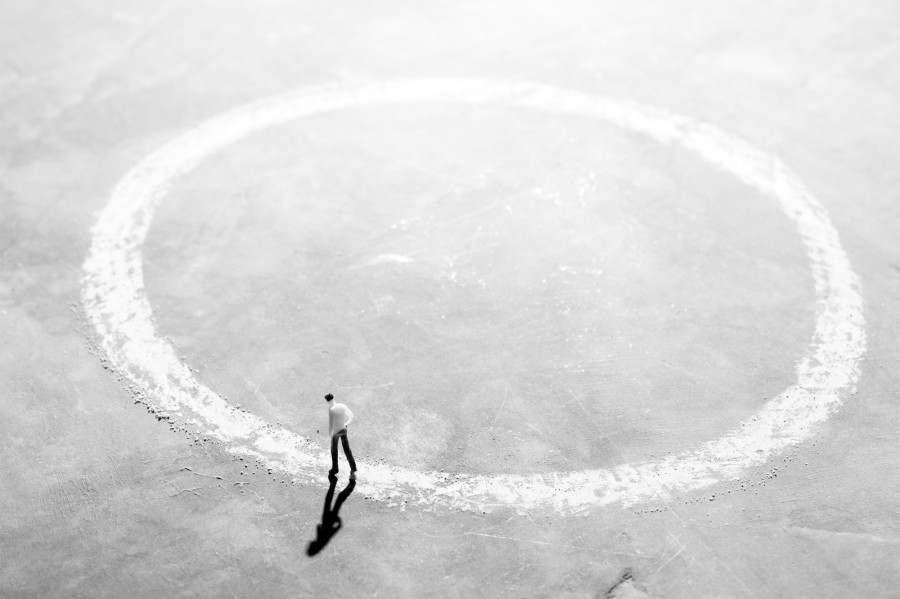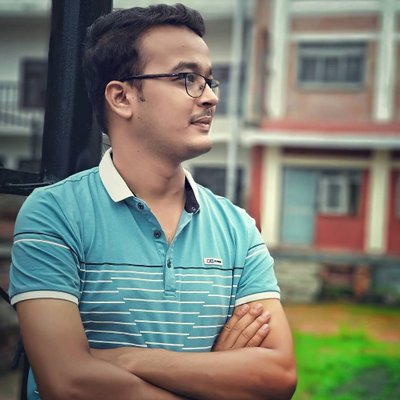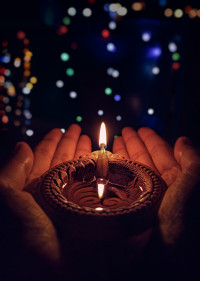As it is
Same old, same old
Here it starts again, every October, without reason or rhyme. Every act a mere repetition of what was done before; every speech a replica of what was said before.
Bibek Adhikari
Inside the living room of a distant relative. Sitting straight on the floral embossed sofa, afraid to move a muscle. Lattice windows welcome the warm October sunlight. The crystal chandelier, reflecting the light, hangs like Damocles Sword. Not knowing what else to do, we watch and wait.
One leg draped over the other, hands behind his head, our host clears his throat and speaks, “Look at this city. Dust and dirt everywhere.”
We look out of the window at the box-shaped houses arranged in a neat row. Two crows sit on a telephone wire and caw before taking their wings and wheeling away.
“And the traffic,” he says. “It takes hours to reach anywhere.” We nod, deeming it to be the safest thing to do.
A rich odour of fragrances, eau de parfum and eau de toilette mixed with the fresh smell of parijat flowers, wafts in. Footsteps shuffle on the stairs. Merry voices join—and a peal of laughter erupts. The bankers, real estate agents, hoteliers, and INGO-lords have arrived in their Toyota Corollas.
They comment on the weather, the dust and dirt, the lumbering traffic. “No system in this country,” one says, while the others click their tongues. “Only the commies thrive. Haina?” We all nod and say “ho-ho” and go back to admiring the lush living room.
Old yearning and loneliness linger in the mahogany furniture, or perhaps something unknowable and unsayable creeps over them, like shadows. It’s as if these luxury items were added, like an afterthought, once our host started minting green dollars. The afterimage of the American Dream flickers on the larger-than-life LED screen.
“A gift from my son,” he says, “from Amrika. Two thousand dollars only. I kept saying no, but ke garne!” What to do? He smiles; we smile in return. We don’t know what else to do.
A bored-looking Saint Bernard walks in, licks his toes, and cuddles against his pudgy legs. A chubby boy, tapping on his new iPhone walks in, clicks a dozen pictures of the dogs. “Come, Sheru, let’s play,” he says, in his make-believe American accent.
“A gift for my naati,” says our host. “Only sixty thousand. He loves dogs. Ke garne?” What to do? He chuckles; we force ourselves to chuckle.
Imitation saves when mingling with the nouveau riche. It helps us dream that one day we too might buy expensive dogs and brand-new iPhones and invite the poor relatives and say, “Ke garne!” We must yearn for the future.
The perfumed air is full of possibilities. If only we knew the formula, the right mixture of odd chemicals that would magically transform our ragged selves into something lustrous. If only we knew where the green wads of crisp banknotes grew. We could have made it, beyond the Goldstar shoes and Nokia phones. That is our fantasy.
***
Here it starts again, every October, without reason or rhyme. Every act a mere repetition of what was done before; every speech a replica of what was said before. Year by year we repeat the ritual, unable to get off the hamster wheel.
We commute to three relatives’ bungalows in an over-crowded Mahanagar Yatayat, smelling the crisp stench of new clothes and old sweat. Throughout the journey, we make small talk: weather, traffic, life in the city, a secondary job, a secondary diploma. What is a middle-class family if not a bunch of people making small talk in crowded buses, avoiding any meaningful conversation whenever possible?
We walk to the house from the bus stops, buy apples and bananas, and ring the bell twice until a manservant comes running to open the wrought-iron gate. We walk in, a little concerned about the videshi dog that lives a far luxurious life than we ever could. We greet, bowing, and reaching for the stinking yet pedicured feet. We smile the perfect jack-o-lantern smile.
We receive tika, accept a handsome dakshina, customarily place our foreheads on their toes, gobble a spicy lunch of basmati rice and meat gravy, and commute back home. Every year, with profound precision and unwavering enthusiasm.
***
Back home, the dreaded existential question raises its ugly head, ready to strike and poison our happy hearts: Will this ‘eternal recurrence’ ever end? Is there a way out, out of all this meaningless repetition of senseless events? Or, as humans, are we doomed to repeat and relive, like Camus’ characters trapped in the narratives, until death comes galloping in the darkness?
Ke garne?
The question swells like a tumour in the back of our heads.
Drifting between sleep and wakefulness, we plot and scheme, from applying for the diversity visas to running away from the Capital to other forms of escapes—the ones that make you look in, to travel inward. We sit cross-legged, eyes closed, dreaming of a better world. We breathe in and breathe out, each breath a reminder that we are alive, that we live and breathe, that this unplastered concrete box is not a prison but a privilege.
But even with my eyes closed, I cannot deceive myself, for what I want to do is—as my favourite poet once wrote—“Tell the truth but tell it slant.” But what for? What good are truth-telling and confessing?
Back home, there’s always a litany of demands: an LED TV, a mixer-grinder, a washing machine, a sofa, carpets, curtains, clothes, chicken. We count and we calculate. We take secondary and tertiary jobs. We do donkeywork from eight in the morning to eight in the evening. Letting the officious hakims abuse us, we lay on the ground, sucking on their toes. We break our poor backs for a few extra thousands.
In the hopes of never being short of money, we plant Devil’s ivy in earthen pots.
Isn’t that how the middle class expresses love? By asking for more and by submitting themselves to become the slaves of their petty dreams, and when that doesn’t work succumbing to superstitions?
***
The sun is setting, unable to do anything else. The clouds are red as if besmeared with blood. A few plastic kites zigzag, swooping up and down as if hunting a prey. The air is saturated with a sickening smell of parijat flowers—the kind that blooms every night, having nothing else to do, and lies fallen and trampled the next morning.
We, too, are like parijat flowers, blooming and falling, year after year, having no alternative and nothing else to do.
We want to return, back to small happiness, the simplest of joys, but nothing is waiting at the other end, except endless emptiness, frowning and spitting bile.
In my moleskine journal I write: “Another day goes by, and the world isn’t any different.”
Only the Devil’s ivy keeps growing, twirling up, up—reaching for our necks, forming a close coil, and slowly strangling us in our dreams.




 11.84°C Kathmandu
11.84°C Kathmandu










